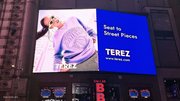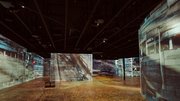Article
DOOH a missed opportunity for Vancouver Olympics advertisers
VANOC forgot about digital signage when it bought $38 million worth of ads for Olympic sponsors, so others have capitalized.

February 17, 2010 by Bill Yackey
When it came time to buy advertising for sponsors, the Vancouver Olympics Organizing Committee (VANOC) put all of its eggs in one mainstream basket. The committee grabbed nearly all of the static out-of-home space in the Vancouver-Richmond area — a reported $38 million worth — but seemed to give only a passing glance to digital out-of-home.
That effort to protect sponsors from ambush marketing tightened mainstream inventories for non-sponsors looking to cut through the blanket messaging of the big boys and made DOOH an attractive option, said Rob Gorrie, founder and CEO of Adcentricity, an aggregator and strategist for DOOH media.
 |
A DOOH screen high above Robson and Granville streets in Vancouver. |
Vancouver has relatively few outdoor digital boards, however, and VANOC took over three connected to Olympic venues — BC Place, GM Place and Canada Place — and owned by Outdoor Broadcast Network, said Barb Welsh. Her agency, Welsh Sales Solutions, sells for three of Canada's major DOOH networks, including OBN. That left her with only a small inventory, including a large double-screen digital board downtown and several indoor venues in Vancouver and Whistler-Blackcomb, the resort area where alpine events are under way.
After Welsh realized VANOC was struggling to sell its own ad inventory and was uninterested in DOOH, she struck deals with 7-11, ReMax, the Canadian lottery and the Vancouver and British Columbia governments, among others.
"The main thing is, we got some categories on there who had not embraced the medium before," Welsh said, which she believes will provide added credibility to what's still considered a young medium. "We were happy with who we sold."
Toronto-based ONTrack Network, part of the Telephoto horse-racing company, also relinquished a facility — Hastings Race Park on the Olympic grounds — to VANOC, chief sales officer Ted Bradley said. ONTrack has about 20 other venues in the area with several thousand DOOH screens, including River Rock Casino, between the airport and Olympic venues; the Canada Sky Train, which runs downtown from the airport; and resort hotels, restaurants and bars. As the games began, ONTrack had only three spots left and expected to sell out, Bradley said.
"It's not a thing where VANOC comes to you and wants to cooperate on a deal," he said. "We're not complaining about it, but it's unfortunate. We would have happily let them sell our spots."
Dodging the brand police
One key factor in selling advertising around the Olympics is severe brand restrictions. Non-sponsors cannot use the word Olympic in their advertising, Gorrie said, and official sponsors advertising on network screens have category exclusivity. But DOOH networks that operate inside high-traffic venues are outside VANOC's reach, he said, as long as they respect brand rules. For example, VANOC has published rules that suggest a Winter 2010 sale is fine, but an Olympics markdown may draw the ire of the "brand police."
 |
An LED board outside of BC Place. |
McQuaid believed his screens, inside several destinations near Olympic venues, fell outside the Olympic footprint. RTN Media ended up with unused inventory, he said, which he used for trade. He thinks those misgivings will dissipate as DOOH continues catching on with advertisers.
Hope for the London 2012 Summer Games
At any rate, most seem to agree that Vancouver 2010 will be the last Olympics where the medium isn't leveraged. London, site of the 2012 summer games, is already a DOOH hotbed.
"The digital piece will be more involved going forward," said John Payne, president of Orlando, Fla.-based Monster Media, which emphasizes linking mobile to DOOH. The agency made a late run at selling DOOH in Vancouver but has turned its sights to London, where it recently opened an office.
"We got pretty far down the road with significant Olympic sponsors (in Vancouver) that wanted to do some cool things," Payne said. "Everyone said, ‘If we'd had this in our planning ...' But if you didn't get traction 24 months ago, you were out of time. A couple months out, you can't change the creative format (sponsors) were working on. It's not a significant lost opportunity for us; our feeling is, let's look at what we'll do in London. Lots of people will jump in; it's better for us to go now."
Gorrie predicted DOOH will see the sort of growth in London that mobile saw in Vancouver. And he suggested ambush marketers won't be so forgiving in 2012.
"I think the London committee will include digital out-of-home for bought media throughout their games," he said. "Like Vancouver with outdoor, there will be a larger purchase across digital out-of-home in package."







